#but also a lot of the bad parts of religion. because these characters are all native american and descended
Explore tagged Tumblr posts
Text
Still on my locked tomb and feudalism bullshit, so here’s a discussion of John, and how I think he systematically uses the decentralized nature of the Nine Houses to avoid the realities of being God.
Essentially, what it says on the tin, but first, context. (Can you tell I’m somehow more unhinged now?). Feudalism is a political structure with a fair amount of decentralization of power. It usually came about in the past after a larger government/political system collapsed, such as Rome. Essentially, a King/Emperor cannot feasibly run large amounts of territory, with the citizens of those territories being from diverse backgrounds and customs, without a lot of loyal subordinates helping out. Enter the nobility.
The nobility do the work of running the lands so that the King/Emperor doesn’t have to maintain a large bureaucracy to, let’s say, collect taxes from each individual person, hold a census, or run a court of law. This does not mean the ruler gets to fuck off, they do have responsibilities to the realm, their court, their knights, and the nobles who support them. Some people have to like you to remain in power, otherwise you get assassinated.
So what does all this have to do with John? Well, first, I think it’s safe to say from what we’ve seen that the Nine Houses are very similar to a feudalist system. You have a collection of independent, semiautonomous populations that can generally keep themselves together. They have slightly different takes on religion, loyalty to the empire, and necromancy, but they are all unified under it.
Second, I think we can also say that John has a very specific perception of himself that does not always align with the reality. He wears worn, casual clothes that are not the type of thing anyone else wears, but includes a crown of infant bones. He has a casual, relaxed attitude, but also can pull out a speech about avenging death and fighting for the empire seemingly off the top of his head. He doesn’t want Harrow to treat him like God, yet also constantly quotes works from a world nobody but he can remember. His narration of his actions in Nona paint him as seeing what he did as something anyone would do, as not that bad, as the act of a desperate, passionate man. Yet he also rebuilt the world to make himself God and Emperor above everyone else, the head of a ten thousand year long grudge campaign.
The contradiction is inherent in his title, man who became god, and god who is man. Harrow especially points out moments where he seems mortal, human, calling attention to how he otherwise appears completely separate and divine.
John is a complicated character. People smarter than me have written more with better evidence laid out. What I’m trying to get at though is that, to me, John reads as a man who cannot view himself as having vast amounts of power over others on the regular. To a certain extent he has to view himself as ‘just a little guy’ so he doesn’t have to reconcile with the actions that have caused massive amounts of harm. He wants the Lyctors to be his friends and associates, rather than their boss.
The structure of the Nine Houses helps with that. He doesn’t have to regularly speak to the average citizen, or deal with the daily problems of the people and their Houses, or hell, even the people he’s conquered. Mercymorn says something in Harrow about how the Emperor’s seat is the Mithraeum, the place light years away from the people he is supposed to allegedly rule. The place only realistically accessible by traveling through the River, a feat only possibly by Lyctors (for the most part). And we learn that he’s only been away from that for 80 years, and he assumedly spent most of his previous ten thousand years there.
Because he is at the top of the power structure, he can lose himself in the bigger picture and forget about the reality, which is the fact that he is running a colonial Empire that requires the biological death of planets and people to survive.
#can you tell this is half baked#I hope not#this has pushed around my brain so long it is now mush#and I must share it before it is gone#the locked tomb#gideon the ninth#nona the ninth spoilers#harrow the ninth#john gaius#harrow the ninth spoilers#she hates the body john made her so much guys#mercymorn the first#tlt meta#tlt brainrot
128 notes
·
View notes
Text
Many books of the Bible that didn't make it to the official canon(s) and other incredibly important pieces of scripture and literature are only known today because they were preserved in the Ge'ez script in Ethiopia. It is very likely that there are lots of other texts dating to the earliest days of Christianity that are still to be "found", only because there aren't enough international scholars who know the Ge'ez script or work in Ethiopia. There are many, but not as much as it deserves. (Important note is that Ge'ez is both a liturgical language, like Latin, and also is a script, much like Latin or Chinese characters, used by many Ethiopian languages, but others can be written and indeed are written in Ge'ez script, this is why it has preserved such a range of literature)
Ge'ez looks like this:

ሀሎ! ይህ በአማርኛ ቋንቋ እና በግእዝ ፊደል የተጻፈ ነው! ለእርስዎ እና ለቤተሰብዎ በረከቶች!
There was briefly a very bad taste meme calling it a "demon language", with people even copypasting random religious literature in Ge'ez thus making it seem more "sinister". I won't comment on how ignorant and offensive that is.
Ge'ez is an important script and language, much like Greek or Latin, because of its connection to major religions like Christianity, Judaism and Islam. Ethiopia is a wonderful country with a deep, rich history, and is an example of how Africa has always been part of world history. But like all languages, it's also a cultural heritage on its own, worth cherising, preserving, and learning about, regardless of its importance to the rest of the world. Instead of being ignorant for a racist joke, we could always take our time and learn and appreciate such things.
7K notes
·
View notes
Text
thank god someone set up a little website with all the family trees for erdrich's justice trilogy, because its making keeping track of these characters families and bloodlines very easy
#the three books cover three small towns around a reservation and the generations of families that intersect#and are connected through horrible crimes (lynching. murder. rape) and wonders of life (babies. marriages. familial love and strength#the good parts of religion)#but also a lot of the bad parts of religion. because these characters are all native american and descended#from people forced to convert#the reason im confused is because i started the series with the middle book which i read for uni last august#so in the current one certain things are making sense that didnt in the next book#and family connections are clearing up#god erdrich is good at creating a complicated intertwining narrative though all of these characters are interesting and complex i love it#and the way it scapes many years from the late late 1800s to the 1980#its fantastic#i wanna visit minnesota just to go to her independent bookstore birchbark books. it looks gorgeous and the books they sell there#fiction + non-fiction#look fantastic. incredibly helpful as well
1 note
·
View note
Text
Astro observations pt1

Saturn in the 5th house:
Saturn in the 5th house people don’t seem to like children.
It sounds horrible, but they are just put off by all the ruckus the children are making
But I’m not saying that they’re psychopaths: Saturn in the 5th house people are like old people who doesn’t like loud noises, and guess who makes loud noises? Children!
10th house Sun:
10th house Sun people crave attention, they practically live for it. They love it when they get appreciated for a project or something related to their careers: it makes up a huge part of their identity
So please pat your 10th house Sun friend on the back for a project they worked their asses off: they’ll appreciate it a lot
Pluto conjunct Ascendant:
They look like they’ve seen shit.
Someone I know who has this aspect always gets asked if their family is doing okay because of this aspect😭
Also they look like they can keep secrets very well. So they have a lot of secrets, because people tell them their secrets very often.
Men with hard aspects to their mars(squares, oppositions) are red flags to me. And if they have a moon aspect that’s also badly aspected? Run, girl, run😭 Chances are that he might cheat on you or hit you🚩
Lilith 9th house:
They question god a lot. It doesn’t mean that they don’t believe in god, actually Lilith 9th housers are fascinated with their religion. They seem to have a good grasp of religion from an early age because of that.
But often than not, they could create a version in their heads of god that is quite different from the concepts that we learn in church. They love saying thought-provoking questions about god and religion.
Your Venus sign and house placement+ your Juno(3)sign+house placement can tell you a lot about your type.
Ex) I have Venus in Capricorn in 12th house and Juno in Sagittarius in 10th house: Kendall Roy( from succession)
He is my favorite character. I had a crush on him since I was little. He gives off an endearing vibe, Venus in 12th house people likes that in a guy
Contemporary politicians all seem to have prominent Jupiter/Neptune influence in their charts: Jupiter/Neptune placements in your charts can give you luck(winning elections) but also delusions and unclear thinking
Are we all doing okay?😭
Ex. Emmanuel Macron(president of France 🇫🇷 since 2017) is a Sagittarius Sun. He has Sun conjunct mercury opposite Jupiter . He also has Neptune in the 10th house,.
Boris Johnson has Jupiter opposite Neptune
Joe Biden has Neptune in 10th house. He also has Jupiter trining his sun and mercury and Venus . He also has Neptune sextiling his sun and Venus and ascendant
Yoon suk yeol(current president of South Korea🇰🇷 ) is a sag stellium(sun, moon, mercury) and has Jupiter trining his Neptune, but opposing his mars.
Lilith in 5th house+a difficult mars placements(square, opposition) can make you have weird kinks in bed🤭
Saturn in the 3rd house in a solar return chart is a tough placement to have. You might feel really lonely. You might feel cut off from your friends this year. Your communication skills might hit a new low this year.
But remember, this is a Saturn placement: all of this can be improved by hard work. If you want to know what to work on, check the planets that aspect your Saturn
Ascendant conjunct Mars in SR chart(especially if mars is in the 12th house)
could be bad for you 😭contrary to the popular belief that it makes you more assertive
It can make you susceptible to illness or infections. So if you have this placement in your sr chart, try to stay as healthy as possible.
Leo moons are so endearing to me: They are kinda dorky and cute even if they don’t know it. They’re really close with their moms as well.
Aries moons are so pure. They always think for themselves and their thoughts are so interesting to me. They never hold back and they are so bold in their thinking. They are so fun to talk to.
Uranus in the 1st house people are used to being an outcast: something about them is so different and they don’t seem to fit in at all with a group.
Pisces signs are notorious for being delulu but have you ever met a mars in Pisces?Their actions revolve around their delusions(big dreams) and if they don’t get to make their aspirations come true, they’ll get so sad sometimes.
Like or reblog if you want a part two
#astro notes#astro observations#astrology readings#astrology tumblr#astro placements#astrology blog#astro posts#juno#hbo succession#kendall roy#lilith#kendal roy#uranus 1st house#uranus in houses#solar return chart observations#solar return chart#venus signs#saturn in 5th house#saturn#mars#neptune#jupiter#lilith in 5th house
582 notes
·
View notes
Text
I was gonna put it in the tags of a post aabria made but didn't want to be like "hey also my thing!" on a serious post so like. She's pointed out that people's unwillingness to understand that people in the citadel have been and are being good to Suvi absolutely sucks ass and she's right. I admire Suvi as a character and Aabria as the player so much as someone who grew up in church - not just in it but of it. Dad was a pastor, I was in the choir, I taught classes, the whole shebang.
Almost everything about church was fucked to hell, looking back, and I'll carry damage and guilt from it for a longer time yet. Possibly forever. But the people I learned from, admired, befriended, and surrounded myself with were not evil colonizers looking to eradicate every other religion or force convert people or what have you. They were just people living under an ideology that did a whole lot of harm to people outside of it and demanded, as part of its tenets, that you restrict yourself from mingling too much with the Others lest you be confused and turn away from what is written. Hell the Citadel hasn't shown itself to be even that pervasive. I haven't heard a single person question Suvi's conviction to the work of the citadel because of the company she keeps.
Anyway my point is that there is absolutely no reason for Suvi to turn on or even grossly doubt the Citadel, questions about the spells on her nonwithstanding. Aabria is playing on a level of refusing to meta game that is incredible to watch and which makes her point of view very easy to relate to. Suvi's community is stepping up for her. Her friends love her, AND they are upset for valid reasons and puzzling through their own ways of looking at the world - ways that do not come with a manual/guide the way life at the Citadel does. Nothing has been laid before Suvi at this point that would warrant more than a few concerns, let alone full divestment from the Citadel and everyone else Suvi has ever loved, certainly not in the name of two people she would give her life for but who do not in any way have their shit together.
They're just people. Steel is a good person. She is kind, she is sincere, frighteningly intelligent, and a fierce advocate not only for those who are hers but those outside the citadel who deserve respect for the way they see the world and move through it.
Steel is also the right hand of the empire. That is, in fact, the point.
I'm sorry a lot of y'all can only handle stories that soothe hard choices with "well they were bad/mean to you/bigots anyway" and lay it on thick until the moment the character has had enough. That's not actually how any of this works and the realer view of how someone like Suvi would in fact view the world and her place in it is airtight. The chops on Aabria for sticking to it and on Brennan for refusing to mark citadel citizens as evil across the board (or hardly at all) is incredible and the refusal to entertain those ideas as a fan is in fact a skill issue in nearly every case.
#Wbn#Worlds beyond number#To clarify yes baptist/protestant beliefs are colonial by definition but the people around me genuinely believed they were spreading good#The way the empire is bringing its light to the world of umorra
121 notes
·
View notes
Text
I hope that having the Mighty Nein around helps the cast help each other with the stagnant parts of Bell’s Hells character arcs.
The Hells are not good at communicating with each other about their faults. Enter Jester, Veth, and Caduceus, who absolutely will call people out on shit without shame or malice.
The Hells have a narrow view of religion. Here’s Yasha, whose god helped her break away from an apocalyptic cult; Caduceus, who was raised in a religious household and likes helping people even when they don’t share his faith; Fjord, who found peace and self-acceptance with guidance from a goddess who asks so little of him; Jester, who somehow has cleric powers from her fey best friend whom she also carries around as her weasel sometimes; and Beau, who doesn’t worship Ioun outright, but still thinks she’s not bad and seeks out a connection at times.
The Hells don’t much care about other people when they talk about what the world should be like. Here’s Caleb, who wanted to turn back time, then got Wish and could do it literally any day he pleased, but has accepted that in order to change from the boy who was willing to kill his parents, he has to be the man that won’t break the world to bring them back. Beau accepted that people can be flawed in how they love, but she couldn’t let that decide whether she or anyone else is worth love or protection; her whole job is about trying to help the people of the Empire when systems don’t care about them. Fjord handed over an eye of Uk’otoa to save Jester’s life, and then immediately got the Nein back together to defeat Uk’otoa rather than let other people suffer the consequences for his choice.
The Hells were sympathetic to the All-Minds-Burn and only really balked at the Weave Mind because there was a controlling group at the top instead of a regular hive mind. Here’s the team that destroyed Cognouza because it turns out hive minds are a great way for despots to directly control a lot of people and use them like resources. Yasha and Caleb also have profound experience with mind control, conditioning, and memory wiping.
The Hells have some serious identity issues that haven’t been addressed because there’s just no time. (Ashton was an aasimar turned into a genasi; Laudna was treated like a Vex voodoo doll by a wizard who hates Vex; Fearne was conceived and sought specifically to be an exaltant vessel for Predathos; Imogen was hidden to avoid that.) Veth was turned into a goblin by a hag, was racist against goblins for years, eventually realized that her racism came from self-hatred for traits she shared with a specific goblin tribe, and got turned back into a halfling thanks to the dedication of her friends. Fjord wrestled with determining who he was before realizing he had to choose, and that didn’t mean there was a right or wrong choice; just that he couldn’t be someone else.
Like, the Nein would be great for some targeted discussion of these points if the Hells let their judgmental bullshit shine through at any point. It’s just a question of whether (a) the cast want to and put in the effort to do that, and (b) how much time they have to spare for those conversations.
123 notes
·
View notes
Text
HELLO ALL
Im back, I've finished the game and OH BOI do I have opinions about Dragon Age The Veilguard. They're nuanced, there's lots of them, and I'm sure I'll find more as I go into my second playthrough.
I'm also excited to see all of y'all's opinions.
My one line summary is: a good game, a bad dragon age game.
There are many, many pieces of this game I love and will talk about for weeks to come. I loved the expanded lore about the blight, elves and dwarfs, I loved the aesthetics of the game, I loved the ending. I thought that characters were wonderful (although I would have preferred some more controversial characters in there too as we've had in previous games) and the sense of building a team was so much more pronounced than DAI because these people actually talked to one another. The parts with Solas and Varric were well done as well. I ADORED the crossroads.
But overall there was a lack of true connection to religion and culture, and a softening of any moral ambiguity in some of the most interesting groups Thedas has to offer such as the Crows. The game refused to engage in true dialogue with some of the horrifying things it has done in the past, such as prejudice and slavery instead preferring to offer a sanitised world. And the theme of regret was not properly tied to the companions enough to make it feel all encompassing.
I know dragon age can do better because it gave us DAO and DA2 both of which feel very hydrogen bomb over this coughing baby. That being said I did really enjoy myself in this game and am going to be creating more Rooks and playing again. I just do think they pulled far too many of their punches and softened too many things about Thedas. It is unfortunately my least favourite dragon age game, but I still enjoyed it and still love dragon age.
I'm no longer tagging DATV spoilers! Please be warned my blog is not spoiler free!!!!!
Dragon age: The Veilguard Review links
Part One: Why Fenris Could Never cameo in Dragon Age The Veilguard
Anarcharisms, LGBT+ characters and cultures and How I'd Write Taash's Storyline
Why The Veilguard Handles Grey Wardens Better than Dragon Age Inquisition: The horrors of the Blight, the Calling and the Cauldron
How to Formulate Companion Quests: Why a Lack of Theming and Overstressed Game Mechanics Got In The Way
Why Rooks Backstory's aren't Good Fits for this Game (and how I'd fix them)
Why the Dragon King Sucks: an Exploration of What Makes a Good Villain and a satisfying Story Conclusion
"If we use force against our enemies, our allies will remember it": an exploration of the Archon Quest in DAtV.
Main OCs you may here me talking about:
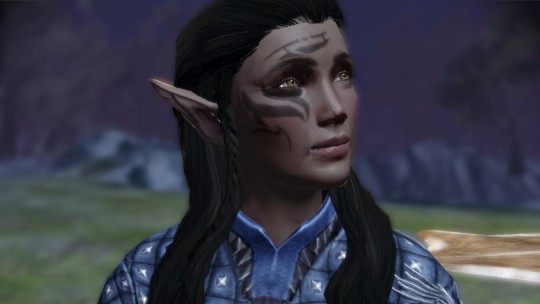
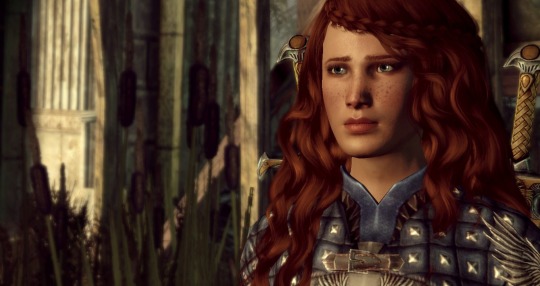
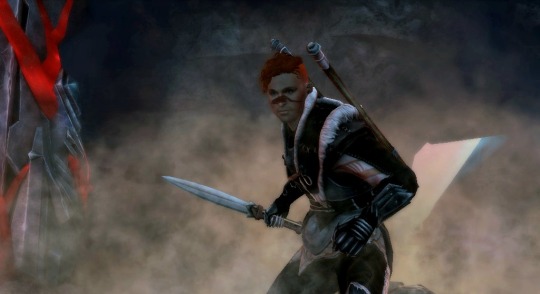
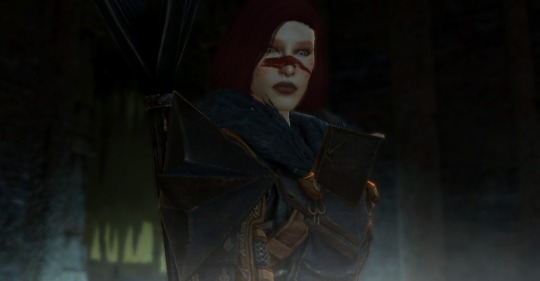
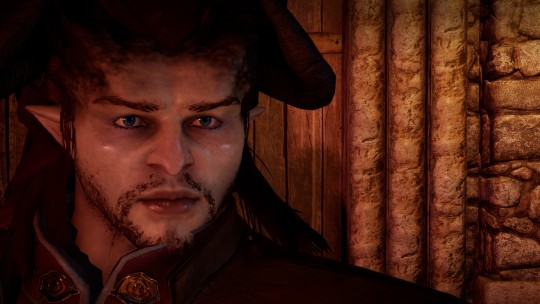
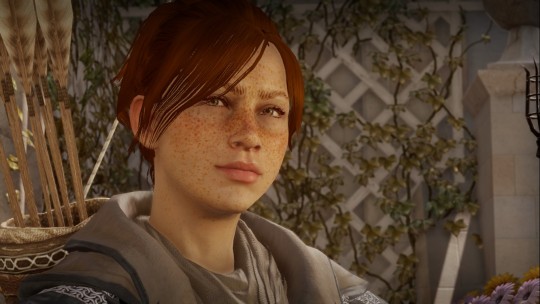
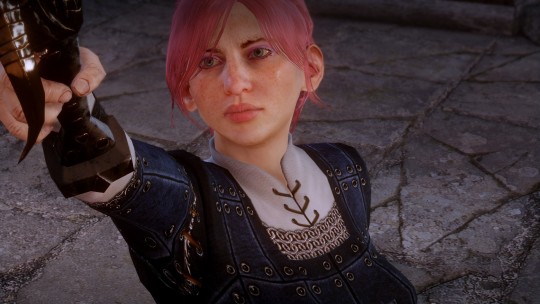
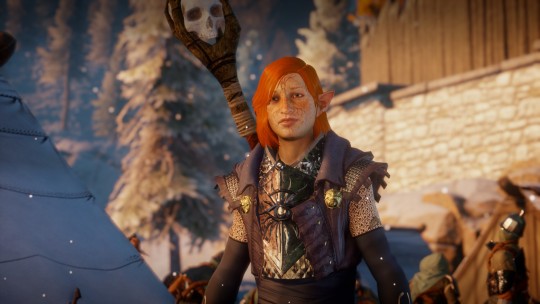
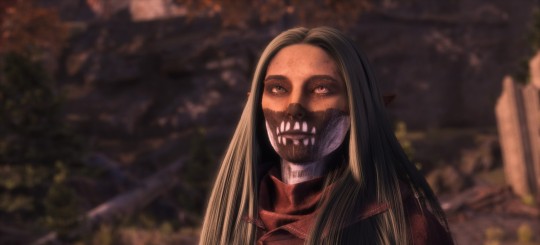
I am currently playing Mass Effect for the first time with Cassiopeia 'Cassi' Shepard:
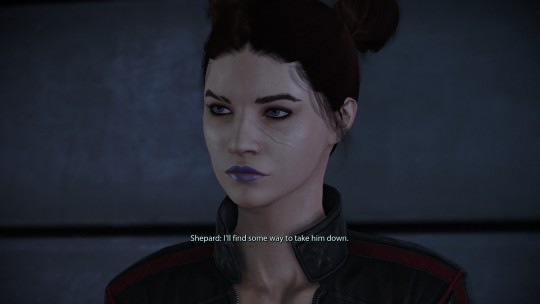
80 notes
·
View notes
Text
The Sins are underused and plain just wasted
TW: Talk about SA, r*pe and a*use
And it hurts so bad yk?
First fumble is that we'll probably never get all 7 Deadly Sins in the same room (Lucifer in HH the rest in HB) - which already puts a damper on a lot of things.
Bee being disgusted by Mammon was already talked about but I'm going to bring it up again. Bee being disgusted with Mammon is not only hypocritical but downright stupid. Bee should be high on serotonin (since she feeds off of vibes) since Mammon was overindulging on unhealthy food - with her being the Sin of Gluttony and all.
These two should have been besties, I rest my case.
(Before I go on, there are no 'good' Sins. None. All Seven Sins go hand in hand one Sin usually leading up to the other)
Missed opportunity with Satan being an actual ruler of Hell before being dethroned. It would add some depth and complexity to the worldbuilding/characters. It would paint Lucifer in a bad light, sure (and would solidify his Sin of Pride) Satan's wrath in being dethroned, having to Rule only one ring instead of entirety of Hell, then Lucifer dips and Satan has to shoulder more work. (Brilliant)
(I'm not taking anything what Miss Medrano says on twitter, if it's not said in the story, it's not cannon)
Asmodeus is a wasted opportunity - his ties to Angels/Heaven - Azazel/Remiel - or Lilith/Adam - being a Nephilim (probably the only surviving one) in lore, Asmodeus was born by 'angels' seed and daughter of a man' in other Adam, The First Man was a*used and SAd by Lilith for over hundred years which resulted in Asmodeus.
Then there's the whole deal with Sarah, her murdered husbands out of jealousy, then him getting banished by Archangel Raphael - what I'm trying to say that Asmodeus' lore is rich and full of potential, which was not utilized - and could explain quite a bit about his characterization on HB and why consent is important for him.
Lucifer is not off the hook either, for he wronged both Adam and Eve (also depending on lore) started war in Heaven because of his PRIDE, caused fall of over quarter(?) of Heaven (as high as Dominion) and fathered Cain - which was another SA (if memory serves correctly) - reducing his to this 'innocent hopeless depressed dreamer' is not only doing a disservice to his character but to Eve and Adam too, along with their children.
Envy - here I'm going to get technical, so you can ignore my ramblings here - Leviathan was one of the Beasts created by God (depends on the lore and also can't look into my notes now) who got defeated by Jophiel and from a piece of their flesh was born Livyatan - the Sin of Envy - and Hellmouth - depends, in some, Leviathan was still the serpent, in the Sea of Envy in Hell. Envy and Pride go hand in hand (both Pride and Envy caused Lucifer's fall)
I think Mammon flirting with Envy would work in a setting where Bee and Mammon are besties, then Mammon starts giving attention to Bee, irking Leviathan and making their Envy flare up
Sloth - laziness and apathy, said person not wanting to work, resourcess being wasted - I think during the court proceedings, Belphegor should not have voted or if prompted enough, be completely apathetic towards everyone in the room - this is the shortest since....I don't have my notes and run on memory alone
(Also, everything depends on lore, what part of religion it is taken from - in some Lucifer and Samael are the same person in some not, Lucifer and Satan are the same and in some not - and so on and so forth)
I hope this makes sense and can see where I was going with this.
Edit: None of the Sins are Fallen Angels, not even King Paimon - not even the rest of Goetia since all of them are siblings all fathered by King Paimon and I do believe with this writing decision in order to vilify Heaven as much as possible, Miss Medrano keeps writing herself into corners
#hazbin hotel critical#hazbin hotel criticism#anti vivziepop#anti hazbin hotel#vivziepop critical#helluva boss critical#helluva boss criticism#vivziepop criticism
117 notes
·
View notes
Text
I wish people would stop treating Kira’s faith like something detrimental to her strength as a character— like, as if being religious makes her any less “good” in their eyes.
Kira is a deeply religious person- it is one of my favorite things about her as a character. It does give her a layer of complexity we don’t usually see, but I wish we could re-frame this and stop thinking about her religion as a type of complexity usually looked at by fans as a moral shortcoming.
Yes, I know it is difficult for socially “progressive” people in our current political climate to see religious characters and not immediately equate their religion with bad things and oppression. But in reality religion, like people, is many layered, diverse, complicated, and so so important to so many people and societies. Religious belief does not always equal Political conservatism and/or oppression: equating the 2 is actually harmful to communities like mine. Like the Bajorans, Jews have survived countless tragedies, and yet we are still here: we are still here, because we didn’t relinquish who we are, which in many cases (not all) is our faith and religious practice. The Bajorans were almost obliterated— their faith united them and kept them going— THIS, is why people like Kira felt so threatened when the federation tried to come in and suppress it (even though they meant well)— Kira’s opposition to Keiko O’Brien teaching Bajoran students about the wormhole isn’t bc she has some kind of moral flaw bc of her religion, it’s because she almost saw that essential piece of their culture destroyed. And if the Cardassians didn’t manage to destroy it by force, the federation just might destroy it by way of “benevolent” assimilation. She isn’t being “anti Science,” she’s just not on board with the idea of the federation totally ignoring and rejecting her people’s autonomy and cultural beliefs. And as a religious Jew, I can definitely understand where she is coming from.
As a socially progressive person, AND as an Orthodox Jew, I love representation like Kira Nerys, because it makes me feel so seen. I too care about fighting injustice. I also love Hashem and I love my culture and I resent the way that secular people talk about us as if we don’t live up to their moral standards because we believe in G-D and have a lot of intricate practices to show that belief that don’t make a lot of sense to them. (Assimilation is in itself a form of oppression you know)
Kira being religious is a beautiful part of her character. Yes, it makes her “complicated,” but not in that it adds flaws. It adds culture and love and faith and community and passion and so so many things. It makes people like me feel seen and valued. You know what doesn’t make people like me feel seen and validated through? People talking shit about faith and acting like it’s a character “flaw” that hinders someone’s ability to be the perfect paragon of “progressive” virtue. .
#jumblr#star trek#major kira#major kira nerys#orthodox jewish#orthodox Jew#star trek ds9#judaism#people stop being weird about religion for a second please?#bajoran culture#bajoran religion
110 notes
·
View notes
Note
Thoughts on Kirschtaria?
I love Kirschtaria lots but he isn't exactly easy to talk about. Olympus was 4 years but I still think it's too early for this post. Kirschtaria is the one who knows what the entire Animusphere plot is about. Until his final scenes, where he opens rebellion against the CHALDEAS and tries to unfold his secret plan, he's under constant surveillance by the priestess and pretty much all of his actions and speeches inform of CHALDEAS's (Marisbury's) beliefs rather than his own. A good analysis of Kirschtaria needs to wait until we know what exactly he was involved with.
The post-rebellion parts, where we get to see his past and learn about his ideals, are not easy to talk about either because Kirschtaria is too much of a straightforward hero behind his mage posturing and 5D chess. He's cheerful, accepting, driven to be productive, loves his friends, believes in everyone's inherent potential to be good, and wishes to end inequality above all.
One of the parroted Animusphere beliefs that Kirschtaria showed to genuinely believe in is the idea that humans are unequipped to immediately make the right choice but he puts a positive spin to it making we are experts in fixing mistakes later.
I don't think I can find anything original to say by explaining how his experience with Pino taught him that beauty can come from the least expected places and how much that is reflected in his relationships with Caenis and Beryl, so I guess all I got to close off this with post with is some speculative trivia that never leaves my brain.
I strongly believe Kirschtaria's characterization is the result of Nasu really wanting to write his original version of Jesus but knowing exactly how much of a bad idea it is to portray the central figure of a massively active religion. This is the same guy who made the Buddha into a boss character with no speaking roles and removed Hassan's Allah Akbar chant from every rerelease of Fsn for sensibility reasons. Jesus himself gets referenced as the Messiah sometimes but never by name. Nasu plays safe with this kind of thing.
So instead of Jesus, we have Kirschtaria. Named after the Japanese "kirishito" spelling of Christ, but written with a very unusual romanization because Nasu really wanted the English spelling of the name to contain an anagram of Christ (irscht). Then he put Kirsch through the basic Jesus plot of carrying out a major project to free mankind from its history of sin and enable everyone to do better, with the only life paid as the price being his own. And in true Jesus fashion, this ends with Kirschtaria dying by the side of a huge sinner that he personally pardoned and inspired to be better. And since subtlety is for pussies, we also get a scene where Caenis sees Kirschtaria shirtless and practically straight up says "Dude, you look like one of those Jesus portraits".
I could continue with commentary on how Pino being poor, sickly, and homeless is in line with the standard archetype of characters who appear to receive miracles in the Gospels, or how Nasu's interest in Jesus is tangible again with his next story portraying both Avalon le Faes as prophesized saviors born through special means for the sole purpose of going on a painful journey of pilgrimage fated to culminate on them sacrificing themselves to absolve the people of an ancestral sin but I think it's better not to stretch the idea too much.
192 notes
·
View notes
Note
Would you recommend the SSSS comic? I know little of it beside the very beautiful artstyle and premise
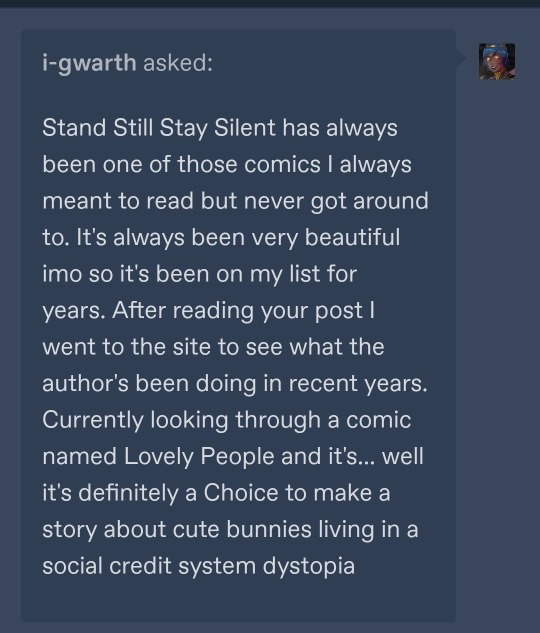
to answer the question of if i would recommend SSSS as a comic: yes, yes i would.
a description for those who don't know: Stand Still Stay Silent is a post-apocalyptic horror + adventure webcomic set in the nordics (norway, sweden, denmark, finland, iceland) that have been isolated from the rest of the world and gone back to their old gods. the the world outside of safe zones is full of trolls and beasts - humans and mammals that got infected by a horrible virus and turned into monsters. the story follows a ragtag crew that ventures into the old world (derelict denmark) on an expedition to collect books.
the comic updated every workday until it concluded in 2022, and consists of two Adventures. the creator had plans for many adventures with these characters in this world, but ended it after two when she wanted to take a new direction with her life.
what i love about it:
- the art is GORGEOUS. it's been a huge source of inspiration for me. open any page and it's a masterpiece, and you will ask yourself "how the FUCK did she update this FIVE DAYS A WEEK"
- the characters are wonderful and endearing. i just, i love them so much. i am so thankful lalli hotakainen exists he is one of my #1 blorbos forever
- the world is so cool. the blend of chunky sci-fi and norse mythology fantasy magic slaps. it goes so hard. i fell so hard for this comic when i got to the big ferry ship with a viking style dragon head prow added to it. it's everything
- it really really gets nordic cultures. it's difficult to explain all the dynamics and nuances but it just gets it. it brings me as a scandinavian a lot of joy to read a story that speaks to my heart this way. the attitudes, the language barriers, the cultural differences... it was so refreshing to me in a media landscape dominated by american stories. when the pandemic hit, i decided to reread the comic because i found such an odd comfort in seeing how it depicted the scandinavian countries reacting to, well, a pandemic.
- there's kittycats
what i don't like about it:
- the most glaring and obvious flaw is that everyone in the comic is white. there's not a single character of color anywhere, not even i background shots or the prologue. there's no mention of the saami people (the indigenous people of northern europe), either. i believe this was done in ignorance more than malicious intent, but the implications are Extremely Bad and it's been bothering me (AND MANY OTHERS) since day 1. that is the number one caveat i will give to anyone wanting to check this comic out. i've been in the discourse trenches and i am not going to excuse this. it's just bad!
- you can tell in the middle of adventure 2 that the creator has kind of lost interest in the work, around the time when she found jesus i guess. like, very few people can keep up work on the same creative project for years and years and years and i think it's fine that she wanted to drop it, but it's a bit sad to see the comic dragged to its end like a limp corpse, and feeling like the creator no longer really cares about the characters.
- minna sundberg has said and done some questionable things, presumably gotten somewhat radicalised over time, and has also converted to hardcore christianity which is what her new works are about. there's nothing about this in SSSS - there is a moment of christianity represented in the story in a sort of mythological sense, just like the other religions, but this was written before minna's conversion. her new works... are a Choice. i have much to say about them, and i have, and im not gonna rehash it now.
SO YEAH hopefully this will help you take an Informed Choice! i got into this comic in 2015 and was deep in the fandom and it's for better or for worse part of my soul foundation now.
i also recommend A Redtail's Dream, minna's "practice comic" before SSSS, based on finnish mythology and the kalevala.
184 notes
·
View notes
Text
Batman #148 Thoughts... or Why Jason Todd is Awesome and Batman Doesn't Deserve Him.
So... I know a lot of the discussion about this issue has been about what happens to Jason, and IYKYK. What I want to discuss are parts of the rest of the issue and why I think Jason is one of the best characters (and more than how many perceive him). *spoilers ahead*
I know many outsiders and even those in fandom look at Jason Todd or the Red Hood and think of him as the hot, angsty edge lord who isn't afraid to break Batman's one rule. He's cool and badass so you want to be like him or he's the romantic fantasy bad boy with a soft side. These things are fine, but this is often where people stop with Jason or if they dislike him the above descriptions are why.
Some people want him to be an antagonist again because villains are cool and this is where we get things like 'The Boys' because it's edgy, subversive, or some intelligent deconstruction of superheroes. Colorful and honorable superheroes like Superman or Spider-Man are boring, just a fantasy, or for kids who don't understand the real world. Again, fine if that's your take, but I don't believe that one "graduates" from one to the other.
Beyond the Fast and Furious style cool factor of fast cars, guns, and explosions that often get associated with Jason, there's more to him than that and it's why he's still one of my favorites. Hell, this is the same character that writers thought would be a priest in the Flashpoint universe, a universe that had gone to hell in a handbasket but in all that chaos and darkness he became a PRIEST.
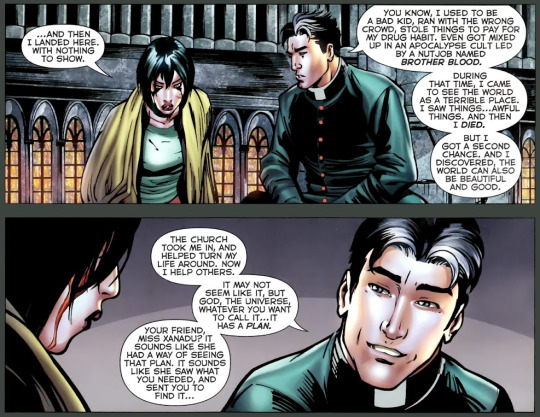
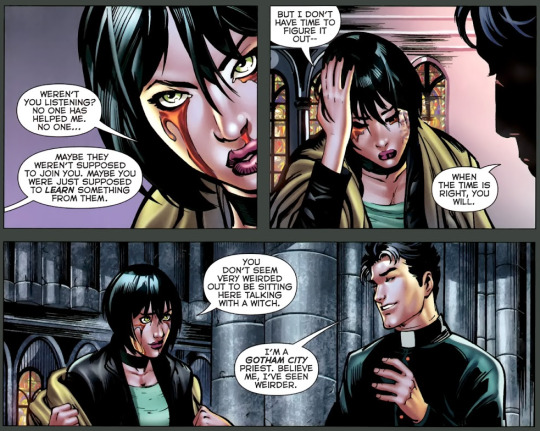
(The World of Flashpoint: Issue #2)
Say what you will about organized religion, Christianity, or the Catholic church (because there are definitely issues there), but I think two of Jason's core traits that I admire are his faith and hope. Traits that often get Jason hurt by the people closest to him, but that often see him through the darkest times.
The cheapness of using Jason's "death" aside, these traits are seen again in Batman #148. Not only is Jason willing to put his faith in Bruce again (after everything "not" Bruce did to him in Gotham War), but he's the first down into the cave.
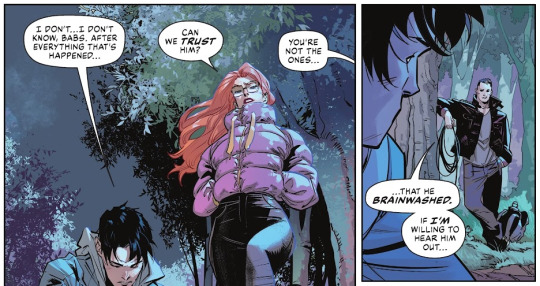
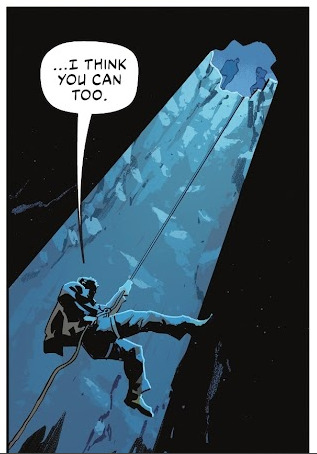
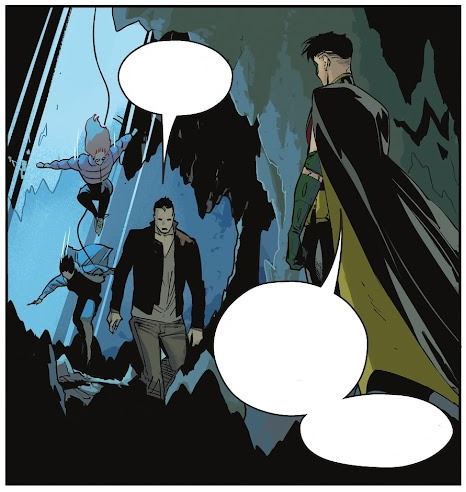
This isn't blind faith, but a willingness to try. A hope that maybe this time he won't be hurt, even if time and time again history has proven otherwise. Note: This can be a slippery and dangerous slope and not one without consequences as many people fall into the trap of going back into or staying in toxic relationships that only bring them pain. (And I never said his greatest strengths can't also be his greatest weaknesses).
We also see some emotional maturity and growth in this issue and I love that for Jason. Has he been going to therapy? Maybe, but my money is that he's probably been reading lots of self-help books or something.
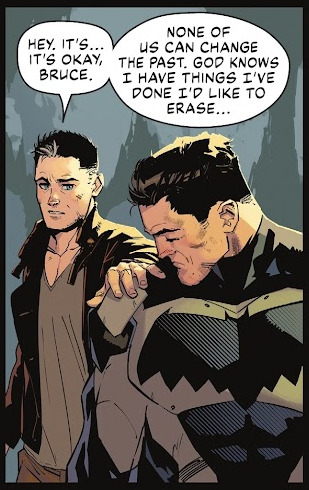
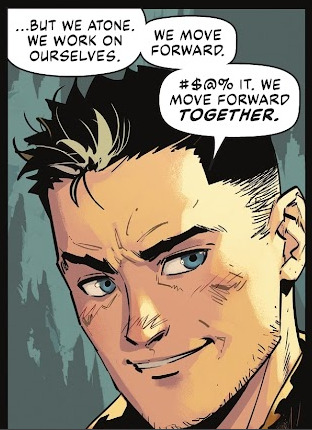
Does Bruce deserve this level of forgiveness and compassion from Jason? No, but Jason gives it to him anyway. I also feel like this is a soft challenge from Jason. "I'm not here to save you from yourself or to ask you to save me. We do this together or not at all."
And if you're thinking, "Oh no, Jason has gone soft. Not my Jason Todd!" He's still a cheeky bastard in battle, even when he's on the ropes.
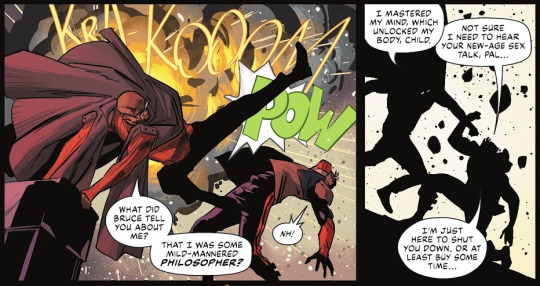
Now, for Jason's "death", one could say that it was a cheap ploy by the writer or DC to get people talking or to have a random "Jason dies" scene (though he's revived in the same issue so I feel the emotional stakes/hype are less compared to leaving it open-ended until the next issue).
One could also look at it in a cynical light given it's Jason that Bruce brings down into the cave during the flashback reveal with the secret Lazarus Kool-Aid. Did Bruce plan that knowing Jason would volunteer in some sort of reverse psychology manipulation? Was it just a random plot explanation to justify having the "Jason dies" scene? Who knows? Though I think Dick or Tim would've volunteered as well. But my focus is on the conversation.
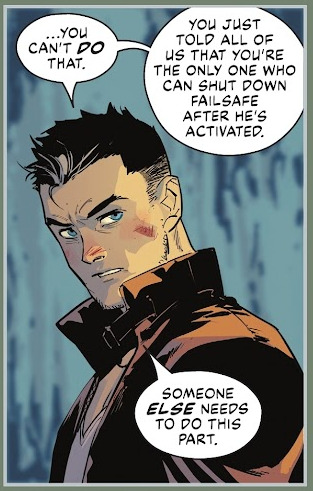
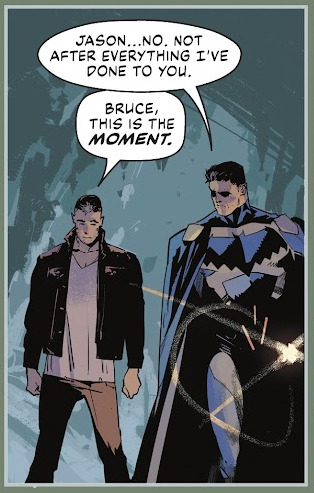
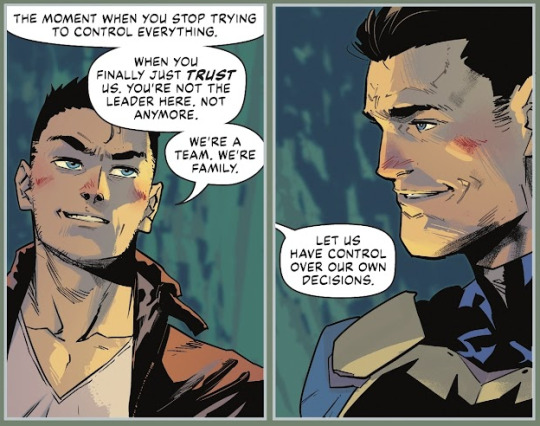
This is another example of Jason's hope and faith, and his faith in Bruce. Bruce's plan isn't tested, though one could assume that he's done the math so to speak, but it's still Jason literally putting his life in Bruce's hands. It's also fairly clever because if Failsafe is some echo of Batman, then something in his programming probably knows about the emotional pain of Jason's initial death. So not only is "killing" going to make him glitch out, but killing Jason is probably the ultimate Failsafe glitch.
Deep down I think Jason knows how much he means to Bruce, even if Bruce is terrible at showing it sometimes. He's willing to take the risk and die, not for Bruce, but for the greater good of saving the day.
Let's also not forget that in the span of a short amount of (in-universe) time, Jason has saved the entire East Coast (end of Gotham War), Gotham City (end of The Joker: The Man Who Stopped Laughing), and is now ready to die again to stop Failsafe--all while his brain is still probably a little messed up from Gotham War.
Let this young man take a damn vacation!
Was this issue perfect? No. And I agree with others about it not being cool that Steph, Cass, and Duke got sidelined as the clean-up crew, but I do think it showed a lot of Jason's deeper character (flawed or not) and how he's more than just the edgy, sarcastic bad boy. That part of him is just the hard candy shell he's had to create to protect the gooey center that is his hope, faith, and love. After all, Damian has previously (and rightly) called him out as the "emotional one".
P.S. I know my previous post picked on Jason's Red Hood outfit at the end and I still stand by the fact that it wasn't my favorite, but seeing that it's Jorge Jimenez's art, I can forgive it. I love most of Jorge's art and would kill (not literally) to be as talented as him, but that outfit design is still a no for me. Sorry, Jorge. :(
#jason todd#red hood#bruce wayne#batman#batman 148#dc comics#batfam#emotional growth#emotional maturity#long post
118 notes
·
View notes
Text
The thing with RPF
Okay, I don't tend to engage much with RPF. I have read it, but only when recommended by someone whose taste I trust (I think it's all supernatural aus that I've read, to-date), and my intention is not to write it. Not really my scene.
However, I really think this fandom could stand to stop treating RPF like it is the devil.
If you engage only with someone in the form of like an hour a week of video of them performing for an audience, particularly if that video is edited, like, when you start mentally rotating characters to create with, your brain isn't gonna draw a huge difference between the guy from the scripted thing you watched, and the person from, idk, mythbusters. Love to see my guy make a big explosion.
In both situations, you don't know them as people, you know them as like, personas, characters. You are essentially engaging with them as fictional characters, cause you only see the small segment of their lives that they put into the video, and whatever story they're telling with that. You don't know them as people, because how could you? So your brain going "hehe what if hunger games au" is just one of the ways brains work.
And idk, as long as you know you're doing that, I think that's fine.
It's fiction. You're writing/reading fiction. It's in the name. You know that it's not true, you're dealing with fictionalized versions of like, stage personas, or teaching methodologies, or historical records, and you can make your little fictions, and you show it to the eight people who are also really into *spins wheel* Ancient Egyptian RPF or *spins other wheel* Taskmaster UK TV RPF or *continues to spin the wheel* Polygon (web series) RPF. You all shake each other's hands and go "man I really like [person/character] and I think about them a lot" and someone else goes "I also think about [person/character] a lot and I think that if he was a warrior cat he would be a kittypet" and someone else goes "I think if [peson/character] would boil an egg the egg would explode cause he's really bad at boiling eggs" and you go "go on". You are all silly together, and you are all doing fiction, and you go on your merry way.
Like that is A Thing People Do On The Internet, and that stays in its its designated space, and that's fine. Might not be your jam but it's fine. That is not more weird than inventing an elaborate imaginary religion for a minecraft world, or working out the emotional nuance of an arranged marrige au between fictional detectives, or carefully making an elaborate interlocking series of stories where someone from a children's cartoon is horribly tortured, rescued, recovers, and gets their vengance. All of that looks weird from the outside, and is a fine and honourable thing to do in your little circles on the internet.
The part where this becomes a problem is when you take your fiction (lies we tell recreationally) out of the designated circle of people enjoying the fictions, and you shove it in the face of the person it's based on, and go "do you like this" or "is this okay" or "I found this and I think it's bad is it bad".
When you are doing the fiction you are engaging with the person as a character which is like, fine, and a truthful reflection of how much you actually know them (not at all, you don't know them), but in shoving it in their face you are going "I don't know you but I want you to react to this for my entertainment/justification, because I think this reflects on you, and apparently I think I deserve your time and attention, and also I think I already know how you're gonna react and I'm gonna use it for my callout posts", which is like, so much ruder than just making fictions about people you don't actually know.
Like writing a superhero au about the person you watch video game speedrun— based. Love the imagination. That is making something from nothing, a great creative act. I could not do that at all but I salute you.
Telling the speedrunner about it? No were you raised in a barn. You are not writing it for the person to approve of— they don"t know you— you are writing it for fun and the enjoyment of other speedrunner enjoyers. Keep it locked down.
As long as we're all aware that RPF is fiction, and we keep it in circles where we're circulating it as fiction— ao3 archive locks exist for a reason! this is not something you want to show up on a google search!— this is just a thing people do for entertainment. Don't bring it up to the person it's about, and you're fine.
And I've been thinking about this because like, I don't think what I'm writing is RPF, but BOY from the outside people seem to think it is! Including the creators! Which means that even while I'm doing my best to adhere to character beats from the story and not just streamer personas, and differentiate between the dude in england and the dude in 3rd life, also I should be aware that if the creator hits it, he's probably gonna think that I'm just writing this about him.
Things go SO MUCH BETTER if the creator only finds it if he goes "huh I wonder what people are writing about me" and deliberately goes to look for it, not if he's just going along thinking about disney movies and someone comes screaming into his field of view like "people are writing about you on the internet". And then he's gotta deal with the ways he's percieved, and whatever weird warrior cat situation people were putting him in, and the fact that people don't know him but think he can't boil an egg, and the 3rd life cannibalism aus, and and and— it's a mess. Please don't do that.
All of this to say A) RPF is fine actually that's just like one of the ways storytelling works— we're not writing RPF but it isn't the devil either. B) STOP TELLING PEOPLE ABOUT FANFICTION.
#discourse#rpf#I had to sit through people ask phil TWICE on friday what his favourite fics are#and I could have bitten through the screen#fandom meta
1K notes
·
View notes
Text

a fine line between god and animal | logan howlett x fem reader
prologue - that which cannot be held in your hand | masterlist
your mother was a god-fearing woman. but she feared you much more. some part of you was wrong, at least in the eyes of god, but you answered to something much bigger. and so did he.
hi friends, this was written when i was struck with inspiration by the one and only ethel cain. of course, the inspiration was paired with my recent renewed interest in wolverine and x-men. some of the characters are more like how they are in the comics because the movie writers did them dirty! like jean slays in the comics okay! anyways, i wanted to write about wolverine and it be sexy in an ethel cain way. do we get the vibe? i hope so. also, i, in fact, do not have religious trauma but if you do this might be the story for you. enjoy.
warnings: cursing, religion, religious trauma (will pick up), lowkey a lot of blasphemy, people be bad sometimes, reader's mother was not chill, a ton of exposition (sorry!), i’m writing this mainly for practice (especially regarding dialogue, so that’s why some of it might be kinda choppy), definitely won't be canon compliant, 4k words
━━━━━━━━━━☆━━━━━━━━━━
By the grace of some unholy god were you created.
The priest with silver hair expelled the demons from you; those crawling, crushing, wriggling, squirming demons that lived within you. Those demons that whispered in your ears, caressing your skull with a language lost to time. They pushed to be revealed. Today, your mother shoved you to your knees before the altar of your true Mother, the Mother of all. “Holy Mother, bless this rotten soul,” she whispered by your side, eyes clenched shut. You watched her. There were no tears, not for your lost soul. Your rotten soul. As if your morality was like an apple. Something that could shrivel up and die if left too long in the scorching sun.
Your skin crawled under the light that beat down on you through the skylights of the church. The air was thick with incense and smoke from the ever-burning candles. The stench filled your nose. Your mother grasped your hand in hers, forcing you to focus on her words. She spoke so quietly, so quickly, you’d think she was chanting some spell. Something to save you from your fate.
“Heavenly Father, take the Devil’s spirit from her body; take this ugly, horrid wickedness from her.”
You closed your eyes, not in prayer, but to lend your ears elsewhere. To the birds chirping outside. The wind whistling through the trees.
You were connected to nature. In some primal, peaceful way.
Before your father died, he would take you into the woods and you would wander together. Sometimes you would pack supplies for overnight trips, sometimes you would bring nothing but your spirit with you. Now, you thought he knew that something was different about you before you did. When you were a stumbling child, he knew. There were days he would force you to lead the both of you back to safety after getting you lost in the middle of the woods. Force you to reveal yourself to him. The part of you that God shunned.
And you did.
Your spirit became one with the natural world around you. You could hear and smell and see. For what felt like the first time. It was a beautiful thing that came over you.
The trees spoke to you, in their ancient language lost to humanity. And you spoke back. Using sounds that had never before emerged from your lips.
And they led you home.
Never once did your father ostracize you for your gift. That’s what he called it. A gift.
When you turned sixteen, your gift shifted. You fought back as it reared its ugly head at you. It pushed and pulled at your insides, begging to be released fully. The day your father died, lying still in a sterile hospital bed, it burst out of you. The monotonous tone that rang out death filled your ears as you lay beside him on the thin sheets. He wasn’t supposed to die like this. Not here. The thought blared in your brain. He should’ve been somewhere he could see the sky, the trees, the clouds, not the plastered ceiling of a hospital room.
In your memory, nothing changed. But your mother, eyes blurry with tears, watched as something inside you morphed. You became still, grasping your father’s hand, and whispered something that sounded to her like sin. The tongue of some animal, some demon. She watched as her daughter became something unholy. Your eyes went pitch black, your skin glowing with a soft light. And suddenly, vines were creeping into the room from all around.
Through the window, the door, from the cracks in the ceiling. Crawling to the thrumming in your veins. The winds answered your call, blasting open the window, broken glass scattering across the linoleum floor. Your mother screamed at the sound.
As vines wrapped around your ankles, around your father’s bed, your mother watched as you continued your senseless muttering. She couldn’t move to stop you. She began to chant a prayer of protection. For herself, for her husband’s lifeless body, for your soul.
Anger filled your spirit, the anger of a thousand year old mother. Tar filled your veins, smoke filled your lungs, oil in your eyes. The drilling, the pounding, the burning, the slaughtering. It all pushed into your brain as the vines choked your soul. And you screamed.
Your mother grabbed the metal tray from your father’s final meal and slammed it against your head.
And she continued to pray. Gripping your hand until it hurt. And you let her. Let her expel the demon from you.
Your bare skin bathes in the moonlight shining through the early autumn foliage as you sit on your knees before a different altar.
You cringe at the memory of your bruised knees and that crushing hold on your hand. Begging God to turn you into a flower, while your mother begged for your mortal soul.
You shake your head to clear the memory. That was ten years ago now. Seventeen and terrified of who you were, what you were. She was wrong about you and you were wrong about you.
The day the priest came to perform another exorcism of sorts, something that had no effect on you whatsoever, a new man had entered your bedroom. A man in a wheelchair. Professor Charles Xavier. He saved you.
Made your mother forget who you were.
And you came to live on a beautiful estate in upstate New York with people like you. Mutants. A word used in such a way you had never heard before in extremely rural Oklahoma. “What do you mean, mutant?” You asked, not sure if you should feel insulted.
Professor X looked at you from across the plasticky diner table, studying your features. You studied his right back. Soft eyes and a kind smile. Such a stark contrast from your mother’s severe gaze and thin-lipped grimace. “Mutants are like regular people, only with a mutated gene that gives them special abilities. I’ve been studying mutants and their mutations for decades. Each mutant I meet is unique and you are no exception.”
Your eyebrow raised ever-so-slightly as you sipped on a strawberry milkshake. “How many are there?”
And so began your relationship with Charles Xavier. He became your mentor, someone to go to for guidance. He assisted you in harnessing your abilities, treating them like a muscle to train rather than a burden to bear. And yet, every night you prayed to God that you could be rid of it. That you could go back home and live a normal life.
In your years at the mansion, friendships blossomed all around you. You never made friends easily back home, but here they came quickly and firmly.
And you felt complete. You are complete. You remind yourself.
Something deep inside of you grumbles in response.
You ignore it and stretch your arms to the sky, cupping the moon in your hands. The moon is slightly out of your jurisdiction, but she controls the tide, which controls the winds. It all works in harmony, you’ve learned. When another girl with similar mutant abilities arrived at the mansion a few years after yourself, you became close partners. Storm, Ororo by birth, was your closest companion. She had striking white hair and a piercing gaze and a personality to match. In combat, she is your most trusted partner.
You spin your arms in a practiced circle, beginning to feel the thrumming of power in your veins. Every full moon, Charles would send you out into the woods of the estate to become one with your abilities. He says the most dangerous mutant is a mutant that severs all connection to their powers. One that has no real idea what they are capable of. “They could destroy a whole city and not understand why,” he replied when you first asked him the meaning of these exercises. “You must be in tune with yourself if you ever want to feel some semblance of control.”
Control. The word forced a shiver down your spine. Mother Nature revolts at it.
And yet, you managed to tame the primal part of yourself. The part that screamed to be let loose.
The world pulses around you as your eyes flutter shut. This is your favorite part of the night. When you merge with the natural world. When you feel and hear and see everything around you. The flapping of an owl’s wings. The beat of a young doe’s heart. The smell of the moss and the dirt and the stream miles away. You feel another heartbeat. This one is firmer. More distinct. It reminds you of the steady thumping of your father’s heart when you would lay on his chest as a small child. You can’t pinpoint its location. It seems to come from everywhere at once. A sense of serenity washes over you.
And you simply listen.
You spread your fingers on the plush grass below you, feeling that heartbeat skitter along your skin and wash itself in the blood that pulses through your veins. You hear the sound of drifting snow, feel its cold sting before it melts against warm skin. Your eyes scrunch up as you focus. The thought of even wondering what you’re tuning into never crosses your mind. You just want to keep feeling and hearing. Your gluttony for the senses takes over and you taste the sheen of melted snow on this stranger’s skin as if you licked it yourself. Salt and something man. You hum. And then you smell something so distinctly like smoke that you are thrown from your reverie. Your body repulses against itself and you cough. Being connected to Earth has its disadvantages.
Desire to return to that state of complete contentment fills your mind, but you stand. Your nude form basks in the moonlight for not a minute longer. You shrug a pretty little silk robe on and make your way back to the mansion. Although it is early October and New York has not yet succumbed to the winter weather, you still feel the keen chill of snow.
As you slowly walk back to the mansion, the new thrum of energy courses through you. It spreads down your legs to the pads of your feet, which leave trails of newborn flowers. As quickly as they are born, they die. The circle of life and death. Darkness and light.
The exact breadth of your powers is still unknown to you and your fellow mutants. Before being taken in by Professor X, you thought they were limited to simply being one with nature. The memory of your father’s death and the events that quickly followed were hazy, but being far away from your mother and her religious zeal allowed you to connect to that piece of your past. To your chagrin, Charles refused to go into your mind to help you remember. It took you two months to fully remember the events. Memories came in dreams, waves of disconnected images all straining in your mind. The first night Charles sent you into the woods to “figure it out,” the pieces fell into place.
And you finally knew yourself again.
Now, you’ve chalked your abilities up to being a reincarnation of Mother Nature, a realization that pulls at the small cross that rests in the hollow of your neck. Despite the trauma incurred by your mother in the name of the righteous God, that part of yourself hasn’t been severed. You remember your father knelt in the church, clasping the chain around your neck, thereby forever bonding you to your faith. You’ve never feared any man you’ve gone against in combat, but you fear the one waiting to judge you.
If He’d even bestow that luxury upon you.
You look up at the sky as you step through the woods, drawing lines between the stars like the ancients. Stringing stories and myths and legends. You wonder if the monsters of olde were simply mutants, like you. Misunderstood and begging to be believed.
The soft glow of the mansion enters your vision. The weight of sleep hits you in the shoulders and you slouch to the back entrance. All the young mutants are asleep at this time, but you hear the skittering of a few rebels in the halls. The mansion never fails to awe you, with its tall wooden walls and bright windows. A far cry from your small rancher of a childhood home. You pass the main entrance and make your way up the stairs that lead to your bedroom on the third floor. This floor is for the older mutants, the X-Men.
Originally, you declined Charles’ offer to be a part of the mutant bad-guy-fighting team. A lack of confidence in yourself, you realized later on. The belief that something was still too wrong with you to even have the ability to help anyone. That belief changed rather quickly.
When you realized there wasn’t much of a place for mutants in this world, you accepted his offer. You took on the name Proserpina, the Roman goddess of spring, at the behest of your teammates. Despite your initial disdain towards the alias, you soon grew fond of the name.
Your ears perk up at the sound of whispering voices down the hall.
Coming from Jean’s room.
Jean Grey is another member of the X-Men and another close friend of yours. You were one of the first people she met when she arrived at the mansion a few years ago. You were the first to confront her about her obvious feelings for Scott Summers, who is something of a brother to you, before she even recognized them herself. You are the first person she goes to whenever she feels out of control, which seems to be more frequently as of late. “He wants you and Storm to track them down,” she says in a soft voice.
“Just the two of us?” Scott asks.
You assume she nods.
You raise your eyebrow. Track who down?
Deciding to enter the conversation, you continue to her room and open the cracked door fully. “What, so Charles doesn’t want me tracking anymore?” You question with a hand on your hip.
They both stand in the center of the room and turn their heads to look at you. Jean rubs at the space between her eyebrows. “Not necessarily. He just isn’t sure you should go on this one.”
“Why? Is it because we’d be fighting Captain Capitalism or something?”
Scott quirks a smile. “He’s found another prospect for the X-Men.”
“And how does that impact my ability to find them?”
Jean approaches you slowly. “Don’t be offended, honey, but sometimes you come off a bit…”
“Bitchy,” Scott finishes with his arms folded across his chest.
Your mouth drops open and you move to slap him or punch him or kick him, but Jean puts her hand on your sternum. “I meant to say, you can come off a bit guarded. And that isn’t always helpful with new recruits.”
��But no one is better at tracking than me,” you say with a pout. “Besides the obvious.”
“Sorry, babe, Charles isn't letting you come on this one,” Scott says with a grin. “Too bad.”
You flick him in the forehead and he flinches. “Asshole.”
“You can stay here and help me with my exercises. Charles is trying to get me to move a car,” Jean suggests. “I know,” she says in response to your eyebrow raise.
“You can barely move a book without it flying at your face. Or, in most cases, my face.”
She shrugs. “Out of the frying pan and into the fryer, I guess.”
“Fine. I’ll be nice.” You turn to leave and toss a dismissive hand up behind you at Scott. “Good luck tracking without me, bitch.”
He hums. “Goodnight.”
As you shut the door he throws out, “Can’t wait to bring them back in record time tomorrow!”
Them. So it’s multiple. Interesting.
That night, your dreams are filled with images of your old church. The windows stain everything around you a blood red.
You are on your knees before the altar of Mary. But today, her hands are folded away from you. She scorns you with a downwards glance of repulsion. You know this isn’t real. It’s not real.
Yet, your body burns in her gaze. Your skin is on fire and no one is there to quell it. You are chained to the floor by your hands, you feel your chest being cracked open to onlookers. Your heart is yanked from your ribs, your impure blood oozing from gray hands. Roaming hands belonging to a wisp of smoke pull at your bones, branding them in silver. Bugs crawl out of the cavity in your chest, maggots and cockroaches. You scream and the onlookers laugh. Your body vibrates with fear and disgust. And you scream.
You wake with hands pinned to the bed by your own force, your necklace set between your teeth.
Your nightgown is soaked in sweat, sticking to your skin. Your heartbeat pumps hard and fast in your ears, an almost unbearable sensation. Not the way you hoped the night would go.
Despite appearances, you are used to the nightmares that plague you whenever there is a full moon. With the resurgence of your power, comes a resurgence of memories.
You spit the cross out of your mouth and slam your head against your pillow.
Dawn has skipped across the sky, bringing streaks of hazy light into the darkness. You stare at the ceiling, allowing your heart to return to its usual rate.
It seems like the dreams are only getting worse with time. You thought they would subdue after a few years, but they’ve been building steadily. And you would never tell Charles that, lest he pry into your brain and see for himself. You couldn’t let him, or anyone, see that part of you. The part you worked so hard to tamp down. It would only make things harder.
Therapy for one?
You laugh in self-pity and sit up, your muscles tense. You stretch out your arms, moving them in circular motions as you control your breathing. The last thing the team needs is something else to worry about. Magneto, your main opposition, has been pushing harder and harder toward his goal of world-domination and mutant-superiority. Charles doesn’t need another burden. You crack your neck and stand.
Your room has floor-to-ceiling windows that overlook the gardens and the woods. A special request you made the first time you moved in. You can just barely see the sun beginning to peak over the horizon, glimmering off the dewy leaves.
Someone knocks on your door. “Yes?” you ask, turning to face the entrant.
The only other person ever up this early is Storm. She stands before you in her leather suit, stark white hair hanging by her shoulders. “Put some clothes on, Charles wants to speak with you.”
“You don’t think he’d appreciate this?” You gesture to your sweat-stained dress.
“Bad dream?”
You shrug. “I was actually having very passionate sex with Christian Bale.”
“Slut!” She smiles, but her eyes see right through your lie.
You wink. “Always.”
Ororo is the only person you’ve let see the terrified side of you. The side that you keep locked away. And it makes your skin crawl when she sees straight through you. As if she’s the one that can read minds.
When you’ve changed into a sweater and jeans, you follow Ororo downstairs to the professor’s study. The sun has fully risen by now, along with many of the students. You dodge sleepy children and annoyed teenagers as you make your way to the study.
“I’ll wait out here for you,” Ororo says softly as you open the study door.
“I feel like I’m about to be scolded for something.”
She laughs.
You shut the door behind you and see Charles sitting at his desk. “Good morning, Professor.”
“Take a seat.”
You grin as you make your way to the plush seats in front of his desk. “Am I in trouble?”
He smiles back. “No, you’re not in trouble. But I did need to speak with you.”
You nod, allowing him to continue.
“I understand that you already know about the retrieval mission Scott and Ororo are to be sent on today?”
“Yes, I overheard Jean mention it to Scott last night.”
He hums. “How was your night besides?”
He’s referring to your monthly ritual. You smile. “It went well.”
“Anything interesting occur?” he asks with a quirk of his brow.
You narrow your eyes slightly. Is he asking about the dreams? You pivot. “Not really. I seemed to connect to someone far away, though. That hasn’t really happened before.”
He nods, a glint in his eye. He knows you’re omitting something. But he lets you get away with it by switching the topic. “I suppose you might be wondering why I’m not sending you on this particular retrieval?”
You shrug, trying to be as nonchalant as possible. “I mean, it crossed my mind. But it’s your decision.”
“I’m not sending you not because you aren’t useful, you must understand. Or because of you’re 'attitude,' which I must admit, I disagree with. You are truly the best tracker we have. And you are fairly good at calming new people down. However, I have recently been made aware of a plot by Lehnsherr to somehow use you to further his plans,” he says with a straight look on his face.
Before you register the second part of his statement, you feel smug pride at the fact that you were right and Scott was wrong. “Wait, he wants me?”
Charles nods. “Yes, it seems he believes your mutation would be useful to him. But I am not aware of how exactly.”
“How were you able to read his mind?”
“We were both at a speech given by Senator Robert Kelly a few days ago. I found his mind in my scan of the room. His is much different from everyone else.”
The unspoken part: We are connected.
The professor never seems to fully admit the strong connection he has to Erik Lehnsherr, but you sensed it the same way you sensed Jean and Scott. It might be different, it might be the same, but the history they share has never fully dissolved.
You wonder if a part of your mutation is sensing innate connections between people. That invisible force that pulls some together, while pulling others apart. That which cannot be held in your hand. You suppose it is something only nature could define.
He continues. “He believes that your connection to nature could be used in conjunction with his control over metal. How? I’m not sure. I’m not sure even he knows.”
You consider this, bringing your hands together. “So you’re nervous I wouldn’t be able to hold my own against his goons?”
“Not necessarily. But if you were abducted, we might not be able to reach you. It’s safer if you stay here with all the protections this mansion affords.”
You fight the urge to roll your eyes. “Are you sure that’s the only reason?”
“It’s the only reason I need.” He looks at you with such care that your annoyance pauses. “If not sending you on a monotonous tracking mission means keeping you from uneccessary harm, then I will do it. Even if it upsets you.”
You break his gaze and sigh. “Fine. I’ll stay.”
He leans back in his chair and smiles.
“I just hate seeing Scott’s ‘I-did-better-than-you’ face. He’s so smug,” you whine.
“You two have that in common, I see.”
The grin that spreads across your lips is impossible to fight.
Scott and Ororo board the jet after an hour of briefing from the professor about where the mutants are most likely located. Somewhere in Canada. Far, far north.
Before they head off, Scott ruffles your hair. “Hey, don’t look so disappointed. You can stay here and grow some flowers or something.”
You shove his hand away from you. “Shut up.”
“Save that fire for when we get back. You never know what these mutants are going to be like. They could be gearing up for a fight.”
“I think I’ll just let you handle that, since you’re so confident you’ll even be able to find them properly without me.”
“It’s not just confidence. It’s a guarantee,” he says with a grin.
“Whatever. Be safe.”
“Always am. Keep Jean company.”
“Mhm. ‘Bye now!” You say with a wave of your hand.
Jean exits the jet where she was speaking to Ororo and comes to stand next to you. Ororo gives you a thumbs up and she and Scott exit your line of sight. Although you would never admit it, you like going on these missions to keep your teammates safe. And not being able to protect them itches at your skin. Before you go crazy pacing in the hangar of the jet after it takes off, just waiting for them to get back, Jean reminds you of her own practice.
“Time to move that car!” You say with gusto, hooking your arm with hers.
You fight the urge to glance behind you. Your other hand comes up to worry the cross at your neck. They’ll be fine.
ugh i know i know she didn't meet him this chapter aw man....
87 notes
·
View notes
Text
I'm not sure exactly how to put my thoughts into words so pardon my rambling but I'm thinking about how Kristen, Adaine, and Fig's character growth all stems from growing into a person they always could have been in a better situation. Also, it's interesting the way the bad kids seem to bring out these parts of each other because they're healing!
Like I know it was a kind of jokey moment but Adaine's little "Fabian hit me!!!!!" versus her insistence on being independent to the point of endangering her mental and physical wellbeing! She grew up so independent, unable to ask for help because of the risk of being ridiculed. She never asks for help and holds herself to an incredibly high standard. But that's not how her childhood should have ideally gone! She was supposed to have a big sister to tattle on and fight with, she was supposed to be taken care of! The BKs make her feel safe and cared for in a way her family never did, so her character development very much means slipping into the "little sister" position she was always supposed to occupy.
Fig pushed down her natural and newly-forming personality when the very foundation of her identity changed. She threw herself so wholly and entirely into her new aesthetic and vibe and vehemently denied the version of her that came before. Now she's growing to accept herself at all stages of her life, to a version of herself that brings in the parts of both her childhood and post-tiefling personalities that she likes and forms something new that makes her comfortable.
For Kristen, losing her religion made her lose a sense of identity. Without her parents to take care of her or her brothers for her to take care of, she was suddenly accountable to absolutely no one. She has Jawbone and Sandralynn, technically, but from what we've seen neither of them actually parent her a lot. So, she leaned hard into doing whatever she wanted, living wildly, engaging in all the things she never got to before, living a life as far away from her childhood as possible, and that's reflected in her clerical work. She loves Cassandra and wants her to thrive, but hates that what that means has a lot of overlap with what it meant to be Helio's Chosen. Like the daily prayer, the proselytizing, it reminds her too much of the things she was raised to do for Helio, and the fact that Cassandra needs Kristen to take care of her makes her accountable to someone in a way that she really wasn't for a while. Now that she's in the back half of her character arc, trying to bring Cassandra back and working hard for it, she's growing a little more responsible. There have been a lot of good moments this season where she's tried to help other people outside of combat-necessary healing, such as giving Lydia Barkrock the help action and the way she reacts after Fabian attacks Adaine (which I know is technically "combat-necessary healing" but how it happened came across as very Big Sister, like pulling the crayon out of her brother's nose in the first episode, especially with how it was immediately followed not with a bit like everyone else but with "oh no fabian got possessed I hope he's okay!!!! poor fabian!!!!!"
#dimension 20#d20#fantasy high#fhjy spoilers#d20 fantasy high#moss speaks#d20 spoilers#dimension 20 spoilers#ally beardsley#saint kristen applebees#kristen applebees#the bad kids#fabian seacaster#fabian aramais seacaster#gorgug thistlespring#riz gukgak#adaine abernant#adaine fantasy high#adaine o'shaughnessey#fig faeth#fig fantasy high#riz fantasy high#fabian fantasy high#gorgug fantasy high#kristen fantasy high
145 notes
·
View notes
Text
Catherine Morland's parents are described as "plain, matter-of-fact people who seldom aimed at wit of any kind" and all we see on the page of her mother is definitely more plain sense than feeling sensibility. So it is very amusing to me that we also get this account of her taste in books, in a conversation between Isabella and Catherine:
“It is so odd to me, that you should never have read Udolpho before; but I suppose Mrs. Morland objects to novels.” “No, she does not. She very often reads Sir Charles Grandison herself; but new books do not fall in our way.” “Sir Charles Grandison! That is an amazing horrid book, is it not? I remember Miss Andrews could not get through the first volume.” “It is not like Udolpho at all; but yet I think it is very entertaining.”
The History of Sir Charles Grandison is an epistolary novel in six volumes from 1753 (so about 45 years old at the time of Northanger Abbey) by Samuel Richardson, and it features:
The beautiful, virtuous young orphan Harriet Byron, with a fortune of 15000 pounds, being pursued by a whole fleet of suitors.
The dastardly Sir Hargrave kidnapping Miss Byron from a masquerade ball and imprisoning her to force her into a marriage
The valiant Sir Charles Grandison coming to her rescue and fighting Sir Hargrave until he can bring her to safety
Miss Byron and Sir Charles falling in love but knowing that it cannot be, because! he is promised to another woman!
The other woman breaking off the engagement, the hero and heroine getting married, and then valiantly stepping up to help the Other Woman stand up to her family
Sir Hargrave dying of a dueling wound after mistreating yet another woman and leaving Miss Byron part of his estate to beg her forgiveness
It also includes a lot of moralising on religion, virtue, motherhood, and good society, which is probably why it a perfect pick for Mrs. Morland. It's all the thrill of abduction and rescue and devoted pining, but neatly dressed up in a morality tale about being good and proper. So you need not blush to say you enjoyed it and can even recommend it to your daughters.
It is also a book that is known for the constancy of its characters. Their morality, good or bad, is very fixed and plain to see. Which also fits with much of the Morlands' approach to people.
All I'm seeing is 16-year-old Catherine almost tripping over her feet to get to her mother with her current volume of Sir Charles Grandison clutched to her chest. Absolutely squealing with excitement over the Miss Byron being rescued from Hargrave's carriage by a virtuous nobleman who refused to even draw his sword because he abhors violence, while her mother placidly comments on how pleasant it is to see kindness and goodness so well reflected in literature.
279 notes
·
View notes